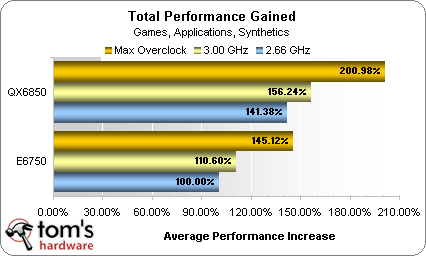Extreme FSB 2: The Quad-Core Advantage?
Performance Summary, Continued
An average of all performance gains helps to illustrate how much faster the four-core configuration will "feel" in a combination of daily tasks.
At maximum speeds for both processors, quad-cores have an average 38% performance advantage over dual-cores (200.98% divided by 145.12% equals 138.49%).
Conclusion
One thing we've learned is that the new and super-expensive Intel Core 2 Extreme QX6850 Compare Prices on Core 2 Extreme QX6850 has outstanding overclocking capabilities, as its 4.02 GHz highest-stable clock speed is barely shy of the Core 2 Duo E6750's 4.16 GHz. If you have the money, the Core 2 Extreme QX6850 appears to be a decent investment for application performance.
Another thing we learned is that our Core 2 Extreme QX6850 is not nearly as FSB-tolerant as the Core 2 Duo E6750, even though it uses two of the same processor dies. One would normally associate the reduced overclocking capabilities of Core 2 Quads with localized heat problems, but the bus speed issue adds another level of complexity to any such assessment.
The QX6850's low bus speed tolerance has two major consequences. First, we couldn't approximate the capabilities of a same-stepping Q6600 and still hope to reach the processor's maximum clock speed, because the CPU simply wasn't stable at the high bus speeds needed to reach its frequency limit at a 9x multiplier. Second, while we were hoping to use the QX6850 in future motherboard comparisons, its low maximum FSB means that we could never find the maximum FSB capability that the latest motherboards have provided using the Core 2 Duo E6750.
And so the Core 2 Extreme QX6850 gets shelved until we're ready to use it in system performance comparisons. Potential G0-revision Core 2 Quad buyers are left wondering whether their purchases will leave them with the same 3.8 GHz limit that our QX6850 had when we reduced it to a 9x multiplier.
Join our discussion on this topic
Get Tom's Hardware's best news and in-depth reviews, straight to your inbox.
Current page: Performance Summary, Continued
Prev Page Performance Summary
